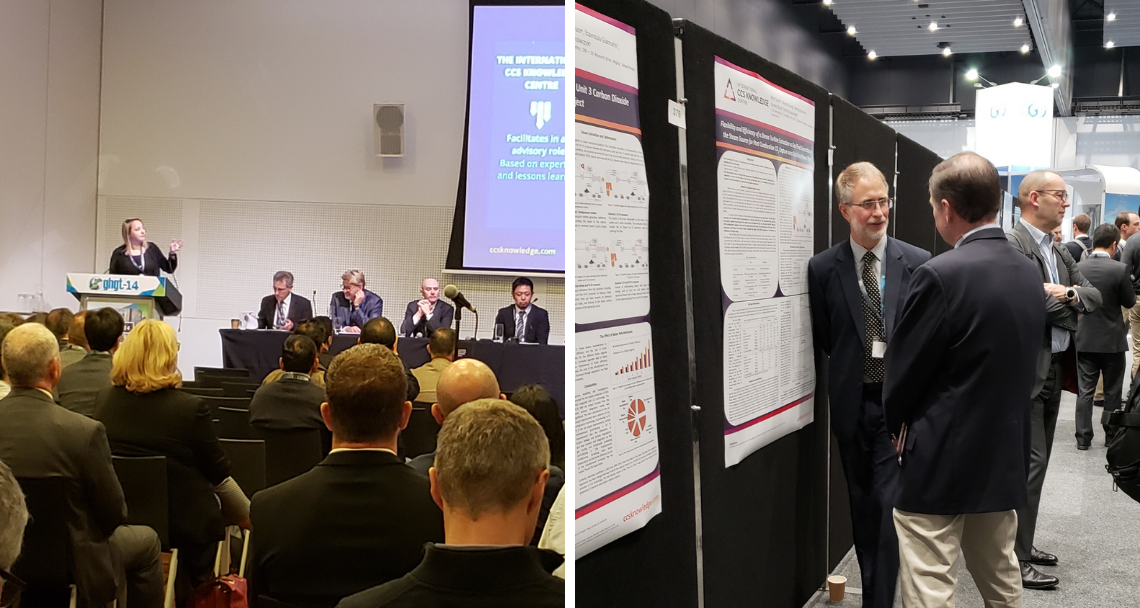Once again, the International CCS Knowledge Centre (Knowledge Centre) has been selected to share its carbon capture and storage (CCS/CCUS) expertise at the IEA Greenhouse Gas R&D Programme (IEAGHG) GHGT conference.
“As an international hub, specifically for CCS research, GHGT is an excellent venue for us to share our knowledge and experiences with deploying large-scale CCS,” says Brent Jacobs, Engineering Team Leader at the Knowledge Centre.
“Through learning and application, we have adapted and expanded our knowledge. This is what we want to share with the CCS decision makers and deployers throughout the world.”
A summary of results from the Shand CCS Feasibility Study — a design for second-generation CCS based on learnings from the operation of the Boundary Dam 3 CCS Facility (BD3) — attracted a large audience at the GHGT-14 conference, held two years ago in Melbourne, Australia. The Knowledge Centre has been actively building upon their experience to further support the reduction of CCS project costs, risks, and other barriers to successfully deploying this this vital clean energy technology in both the power and industry sectors.
“We’re one of the few entities with real-life experience with a dedicated focus to CCS. A lot of the work we’ve done is based on tested application of CCS on a commercial–scale carbon capture plant or learnings from studying the second-generation application of that technology.”
In the spring of 2021 at GHGT-15, the Knowledge Centre will be providing presentations on the following abstracts submitted for consideration ahead of the conference:
WORK COMPLETED ON THE SHAND CCS FEASIBILITY STUDY
A Feasibility Study of Full Scale, Post Combustion, Amine Based, CO2 Capture Retrofit Application in the Cement Manufacturing Sector at the Lehigh Hanson Materials Limited Facility presents the progress of the Lehigh CCS Feasibility Study — aimed at retrofitting a cement production facility at Lehigh Cement Plant, Edmonton, AB, Canada, with full–scale, post–combustion, amine-based carbon dioxide (CO2) capture. This study is a major breakthrough for CCS as it represents the potential for first in the world for CCS application in the cement industry.
Approaching Negative Greenhouse Gas Emissions via Bioenergy with CO2 Capture and Storage is a study which involved performing a high-level cost analysis of converting a hypothetical 305 MW coal-fired power station located in western Canada to a Bioenergy with CO2 Capture and Storage (BECCS) facility. The findings of the Shand CCS Feasibility Study and Phase IV Biomass Co-firing report from the Canadian Clean Power Coalition were utilized for this study.
Waste Heat Utilization for the Energy Requirements of a Post Combustion CO2 Capture Retrofit Study of the Lehigh Cement Plant, Edmonton, Canada is a study that looks at determining an alternative energy source for amine regeneration as previously utilized methods do not apply to cement plants since they do not normally produce steam. Lehigh Cement and the Knowledge Centre on November 28, 2019 announced a joint feasibility study of a commercial-scale CCS project, which received an investment of $1.4M in provincial funding from Emissions Reduction Alberta (ERA). As CCS moves into other industrial sectors, such as the cement manufacturing industry, novel heat recovery and heat integration methods will be required to meet CCS energy requirements.
RELIABILITY IMPROVEMENTS TO BOUNDARY DAM 3 CCS FACILITY
Derates and Outages Analysis — A Diagnostic Tool for Performance Monitoring of SaskPower’s Boundary Dam Unit 3 Carbon Capture Facility is a study that assesses design deficiencies and operational challenges that reduce the capture rate of a CCS facility, especially “first of a kind” facilities, that typically have unforeseen barriers that hinder performance of the capture facility. A rigorous derate and outages analysis was established to evaluate and predict operational performance to enable proactive planning and help to better understand the workings of the process while ensuring the needs of industry are met. Establishing CCS as a viable CO2 emission mitigation strategy for various industries will require identifying and eliminating existing barriers to achieving desired performance.
SaskPower’s Boundary Dam Unit 3 Carbon Capture Facility: The Journey to Achieving Reliability is a paper that documents the challenges and measures taken over the first five years of operations to improve the performance of the BD3. Reduced capture performance can be attributed to experiencing difficulties in three broad categories of process flows: limitations in flue gas flow, limitations in amine flow, and limitations in heat transfer. Equipment responsible for facilitating these flows was identified, and the installation of redundancy and isolation to key pieces of equipment was instrumental in correcting the performance of the capture facility.
MONITORING AMINE HEALTH
A novel methodology for online amine solution analysis of the degradation caused by fly ash is a study that presents a new online technique to analyse the degradation of aqueous amines (MEA, MDEA and their mixtures) at different concentrations and temperatures. CO2 capture with an aqueous amine-based solvent is one of the most common and advanced technologies for post-combustion CO2 capture. Many aqueous amine-based solvents have already been proposed by different researchers to capture CO2 efficiently from flue gas; however, the technology is still not economical due to high energy requirements for regeneration and operational issues, such as solvent degradation.
View All GHGT-15 Abstracts
GHGT-15 Event Details & Registration
The GHGT-14 Technical Programme Committee completed their selection process from a total of nearly 800 abstracts in April. Prior to the presentations at the conference, full papers must be submitted for accepted abstracts by the December 3, 2020 deadline. ?
“It’s fairly significant to have all of our submitted abstracts accepted for GHGT-15,” says Jacobs. “We look forward to presenting our experienced-based papers in Abu Dhabi and participating in the important panel discussions that help to facilitate the application of CCS globally.”
Khalifa University will be hosting the GHGT-15 conference that is set to take place from March 15?– 18, 2021 in the Abu Dhabi National Exhibition Centre. For more information, visit ghgt.info
